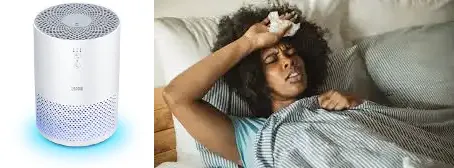
Can air purifiers make you sick? 5 things to know
Air purifiers are great tools to get rid of airborne allergens and pollutants from our homes, but are they really good for us? Can air purifiers make you sick? Should I say Yes? If so, how are they supposed to filter out bacteria and viruses but kill us at the same time?
You may already know about the benefits of having an air purifier in your home or office. There are now even more reasons why you should invest in a good air purifier.
Several studies over the years have shown that indoor air pollution can cause serious health issues. Allergies, asthma attacks, and even cancer can develop due to exposure to mold and other substances. This problem affects millions each year.
Air purifiers are designed to address these challenges. They remove toxins and allergens from the air and provide cleaner air inside your home or office.
It is important to remember that no matter what type of air purifier you choose, they are not meant to replace regular cleaning methods, nor should they replace them. In addition, some air purifiers contain chemicals that can pose a threat to human health.
Now comes the question once again: can an air purifier make you sick? 5 things you must do to avoid getting sick as a result of air purifiers. Let’s see how it goes.
What are Air purifier dangers?

Curious to know the dangers connected to air purifiers? Of course, it has its bad sides too.
We’ll be listing the possible effects an air purifier can have on your health in this article.
Note that effects may vary as it solely depends on the type of purifier you have.
Some air purifiers use high-efficiency particulate filters(HEPA filters) to clean the air, ionizing the air that in turn creates ozone because of their electric charges.
Ozone is very dangerous to health. It can damage the tissues of the respiratory tract, causing inflammation and irritation which results in chest tightness and worsening respiratory problems.
Can air purifiers cause breathing problems?
If you or your pets have a respiratory problem such as asthma. Air purifiers can make it difficult to breathe and other possible symptoms like sore throat, and chest pain.
But Most of the symptoms show when specific air purifiers generate what can trigger health-related respiratory problems.
Also, inhaling unclean air can contribute to difficulty in breathing. Yes, the air purifier is supposed to clean, purify the air and make it safer to breathe. But it can also fail to do its job if the filter is dirty and filled with trapped molecules.
How often do you clean or change your filter? Clean filters contribute massively to the presence of fresh and safe air in the home.
5 things you must know and keep in check
It is quite indecisive if an air purifier can make you sick or not. There is no definite Yes or No. If you think your air purifier is making you sick, then there are some things you should put in check.
For example:
- Are you using some air purifiers that should be avoided? Some air purifiers that produce ozone are detrimental to health.
Ozone has some complicated effects on health.
- As there are good and bad qualities of devices, Air purifiers are not exempted. If you are unlucky to be stuck with a bad air purifier, it can reduce indoor air quality.
And importantly, how often do you trap the filtered air? Air purifiers won’t be able to do their work effectively if there are open ventilations. polluted air will keep flowing into space and the purified air won’t be maintained. That as well might make you sick.
How often do you change the filter?
The filter has a huge role in air purification. Filter filters the air the purifier sucks in and gives it back into the room as clean air. In this case, it means filters play a role in the quality of indoor air.
If your filter is dirty and filled with pollutants, it gives back unhygienic air into space and makes you sick. Fresh clean air is a result of a clean filter.
Can an air purifier cause congestion?
Firstly, let’s deal with the meaning of congestion, what triggers it and the relationship it has with an air purifier. Nasal congestion is mostly caused by humidity levels in the air. Humidity is the presence of water in the atmosphere.
Congestion can mean a concentration in a small or narrow space or cause an excessive accumulation, especially of blood or mucus in an organ. Ozonic generators can cause congestion.
It is something you can hardly ignore. Funny enough, it is enough to ruin our day depending on how bad it is.
Air purifiers are known for filtering out specks of dirt particles and allergens in the air but in some conditions, they can give you nasal congestion. This happens when the air around you is dry. However, this is not enough for you to avoid air purifiers if you know how best to use and protect yourself from nasal complications.
An air purifier pills in humid air and circulates it around the room. Thereby, unstabilizing the moisture level. If your nasal cavity is sensitive enough, the change can throw it off balance, and bring shock to your sinuses which causes inflammation and nose bleeding.
To avoid this, the best is to reduce the humidity level to a comfortable level before switching on the air purifier or making use of a dehumidifier. A comfortable humidity level should be at 30% to 50%. Whenever the temperature drops, it may need adjustments.
Are our HEPA air purifiers safe?
HEPA air purifying technology filters almost a hundred per cent of airborne pollutants in your home.
Remember, mechanical air purifiers are the best and safest to opt for. They filtrate the air, reducing particulate matters(PM)like dander, mold spores or dust mites without the emission of ozone.
A HEPA air filter happens to be a type of mechanical air purifier. Unlike most purifiers, it doesn’t need to generate or produce charges to work well. If you are looking for a good quality purifier that won’t add to your health problems, we recommend you go for HEPA.
HEPA purifiers’ side effects.
HEPA, an acronym for High-efficiency particulate Air, is an ozone-free air purifier that promotes indoor air quality.
HEPA filters contain a weaved material like that of a strainer, with small holes designed to capture large particles, dust hairs and other debris found in the air. So basically, the filter prevents bigger particles from passing through the air.
Meanwhile, the inner and outer layer of the filter works differently. The inner layer traps particles differently. The heavier particles trapped move slowly through the filter and gradually stick to the fiberglass inside the HEPA.
While the lighter-weight particles move faster and can collide straight with the filter network or easily pass through the filter holes.
HEPA filter side effects.
- The HEPA filter net is specially designed to effectively trap pollutants. Especially when they are larger than 0.3microns.
This as well means particles smaller than 0.3 microns have higher chances of escaping through the net which can be passed back into the air.
Therefore, there are chances of the filter capturing particles larger than 0.3microns than particles lesser than 0.3microns. This means small air pollutants can escape through the filter net which creates a disadvantage.
- Molds and bacteria can grow on filter –
There are possibilities of molds and bacteria growing on HEPA filters. Surprising? Isn’t it meant to filtrate them instead? This will be fully explained.
Molds contain microorganisms. It can be large enough to be caught on the filter but it stays alive on the surface while other particles that come in accumulate and start acting like a nutrient which allows the molds to grow on the filter and eventually release spores into the air.
However, this should not necessarily pose a problem if time is not given for the mold to grow. This can be achieved by frequent changing of the filters. This should be done at day intervals depending on how heavily trapped the filter is.
Read Also: best air purifiers for molds
Can air purifiers cause allergies?
Air purifiers are made to trap allergens in the air and push back clean air into space.
The air inside homes contains a combination of solid particles and liquid droplets known as particulate matter. As we breathe, these particles can make their way into our bodies which air purifiers help to remove by capturing them in a filter including allergens.
Anita Ivanova, an allergy nurse consultant at Midlands allergy service in the UK said “Air purification is recommended as a component of environmental improvement for patients with allergic respiratory diseases”.
Nevertheless, some air purifiers can cause some allergies.
There are varieties of air purifiers today. But to get one that suits your health needs should be importantly considered.
Here are a few things you should know when buying an air purifier.
- Do not buy ozone-generating purifiers. These air purifiers deliberately generate ozone that purifies the air and kills living microorganisms in numbers. But ozone can be dangerous to your health too. If inhaled, it can cause long term damage to cells and King’s. And even worsen respiratory health problems.
- Avoid Electronic Air purifiers.
You may think this is an option for ozone emitting purifiers. But do you know, Electronic air purifiers can generate ozone as well? Let’s see how
Electronic air purifiers draw in air that becomes charged utilizing passing air molecules through an electrical field. They create a controlled version of ozone to operate.
A mechanical air purifier is the safest to opt for. As it can work without generating ozone.
Do air purifiers cause sore throats?
Among other symptoms like Headache, chest tightness, cough, asthma attacks and a few others, sore throat is what some air purifiers can cause.
Fortunately, not all air purifiers can cause this. To know the difference is another question that can raise an eyebrow. Right? Not at all. Sit back and take a look at the difference that can be spotted.
There are varieties of air purifiers today. But to get the one that suits your needs perfectly and won’t aggregate your health conditions is a paramount thing to consider when choosing an air purifier.
Most recommended: Top air purifiers for mildew
Here are a few things you should know.
- Avoid buying ozone-generating purifiers. These purifiers deliberately generate ozone in large quantities to purify the air and kill microorganisms in numbers. But it can as well be dangerous to your health.
Negative effects of air purifiers.
Some air purifiers do almost the opposite of what is expected of them to do when you use them wrongly or ozone producers.
Specific air purifiers escalate allergies. Choosing air purifiers is important to avoid health complications.
- Sore throat
- Shortness of breath
- Chest pain
- Cough etc.
What are the effects of ionizers?
Ionizers would have been a better option if they do not generate life-threatening ozone. They are economical as it doesn’t require changing filters.
Intensive research shows ionizers also emit a large voltage of difference( -ion) across some volume of air which creates ozone.
There is hardly any difference between ionizers and ozone generators. As ionizers generate ozone too. It is fairly safe to inhale ionized air but the ozone they generate can be a threat to human life. Ionizers and ozone producers should not be recommended in homes regardless of the manufacturer’s guide or advertisement. To minimize risk to human health.
Ionizers side effects (Recap)
For better understanding, all ionizing air purifiers are also called “ionizers”.
Air purifiers and ionizers are two different technologies in terms of purifying the air. While air purifiers trap and remove particles in the air, ionizers simply create static change around pollutants that are present in the air, once charged with the static, the particles stick to the nearest surface around them.
But is this an option? How do they work? What else do ionizers do at home? These are what we will dive into in this article.
Ionizers or negative ion generators are also air purifying devices. They add or generate negative ions around particles in the room which traps positively charged ions carrying allergens and bacteria. The particles become heavy and fall to the ground or stick to the nearest surface they can find.
Read also: Should you leave an air purifier on all the time?.
Can a new air purifier make you sick?

If you are using an air purifier for the first time, there are slight possibilities of discomfort. In the first process, it may stir up dust particles and other micro variants that can give you frequent sneezing or a runny nose. However, it is not enough to make you sick. I advise you to dust up the room before using the air purifier.
Additionally, you may have gotten an air purifier that generates ozone. Ozone has certain bad effects on respiratory organs. Checking a manual guide before purchasing an air purifier won’t be bad. Regardless of the manufacturer guide or advertisement. Although, not all ozone is bad, here is proof of what ozone is in an air purifier.
Can air purifiers make your allergies worse?
Air purifiers are known to improve the quality of indoor air. But there may be a need to address issues concerning people or pets with allergies.
What are allergies?
Allergies are symptoms that show when the immune system reacts to a foreign substance.
People with allergies may find it complicated to use air purifiers. Most likely, ionizers and ozone generators.
An instance of side effects of these ozone producers is the bonding of oxygen atoms and the creation of ozone. If ozone is inhaled even in small quantities, it can irritate the lungs and make respiratory problems worse. Other effects can include shortness of breath, chest tightness, nasal congestion and more.
Read also: Can an air purifier make the air dry?
Conclusion: Can an air purifier make me sick?
Air purifiers are meant to purify and make the air safe to breathe. What more? It gets rid of airborne contaminants that are unhealthy if inhaled. If there should be a case of an air purifier making you sick.
These are the following you should check out for:
- Ozone generator – Air purifiers that emit ozone to purify air or ionizers. Ozone can cause health complications or make the immune system weak. It can also create or worsen respiratory problems.
- Dirty Filters – How often do you clean or change filters? Remember dirt particles go through the filter before being pushed back into space. This means the filter is housing trapped airborne debris.
Air purification is a continuous process, When the particles clog the filter over time, the filter will be unable to filter the incoming before releasing it back into space.
Change your filters at least once a month except for HEPA filters that need a frequent change of filter because of their heavy-duty. Except for the above listed possible causes, an air purifier can’t make you sick.
